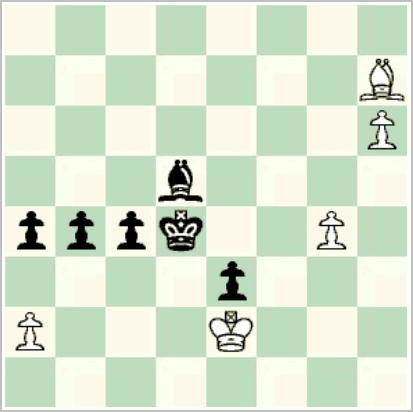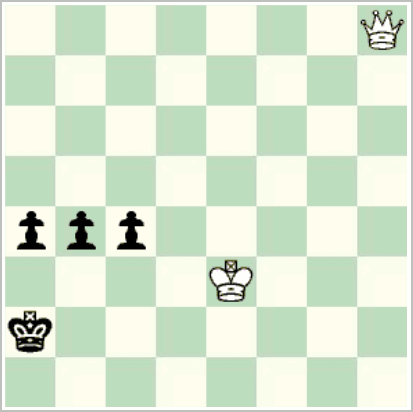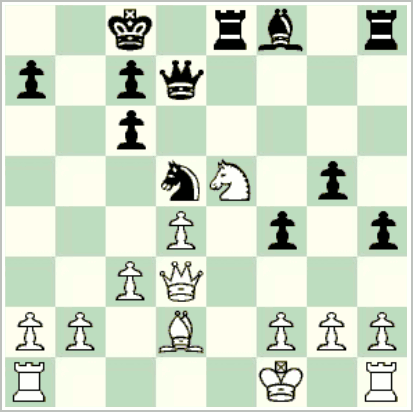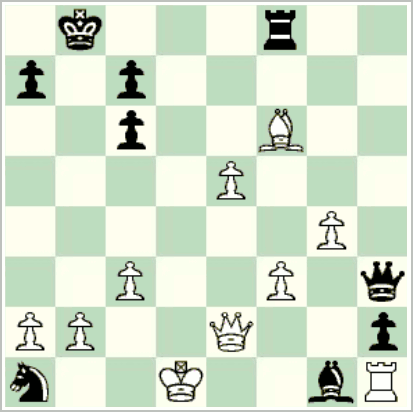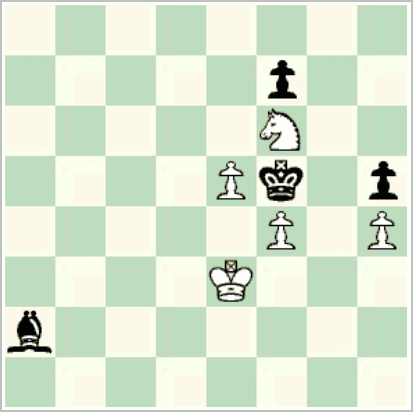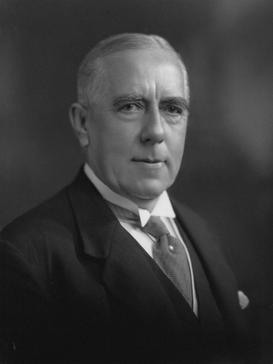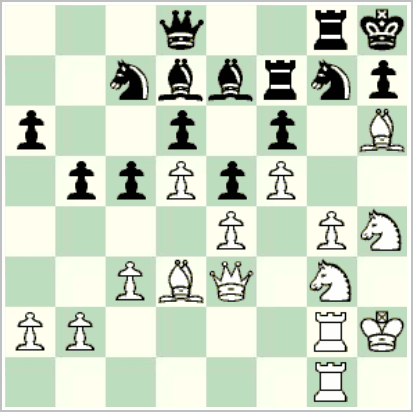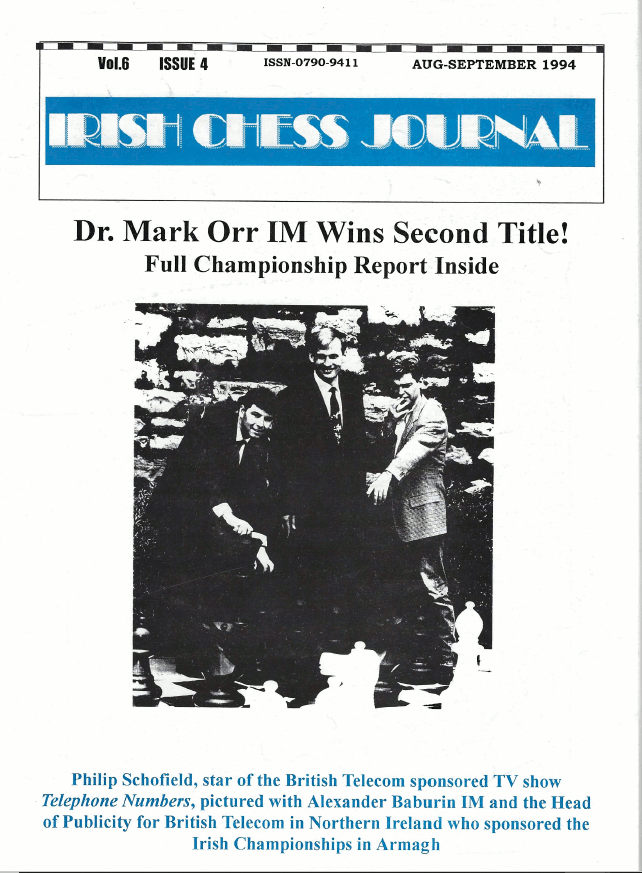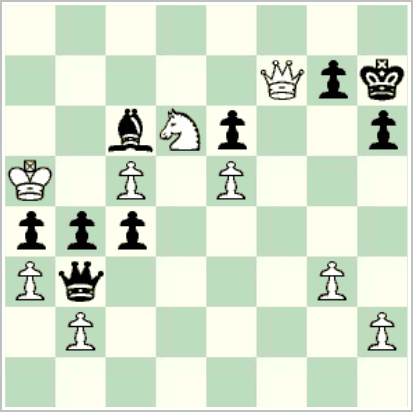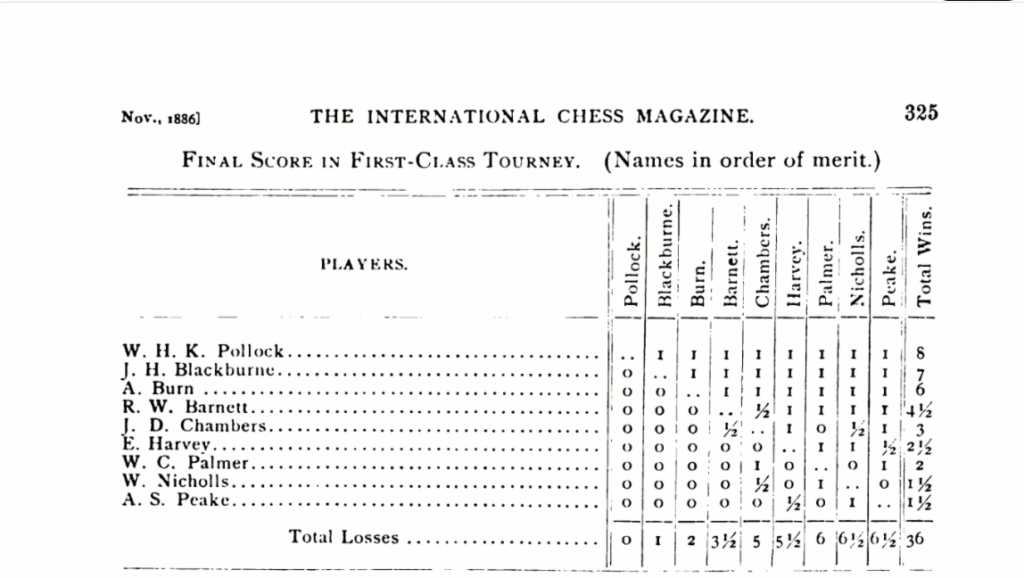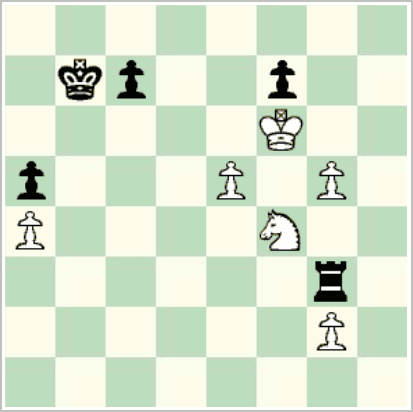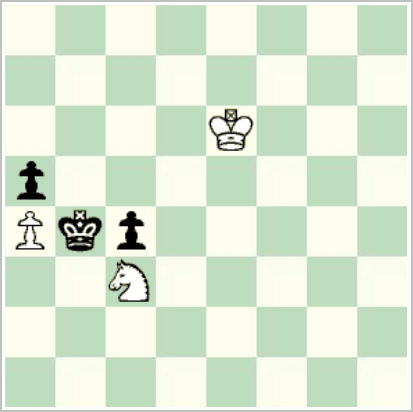The Glorney Cup in 1952 was held at the College of Preceptors, Bloomsbury Square, London, from July 23-24, 1952. Once again, four teams competed.
On the opening morning, England started with a 5 – 1 win against Scotland, while Wales beat Ireland 3½ – 2½.
| England |
|
Scotland |
| B. Cafferty |
1 – 0 |
G. W. Kerr |
| M. N. Barker |
1 – 0 |
R. W. Smeeton |
| P. C. Gibbs |
1 – 0 |
D. G. Weir |
| P. D. Sanderson |
0 – 1 |
G. Sachs |
| R. E. Borland |
1 – 0 |
M. Fallone |
| D. F. Griffiths |
1 – 0 |
D. S. Brotherton |
|
5 – 1 |
|
| Wales |
|
Ireland |
| P. K. Marshall |
1 – 0 |
A. Montwill |
| B. F. Burrows |
1 – 0 |
F. Doyle |
| M. J. Williams |
½ – ½ |
O. Ó Siochrú |
| B. E. Foan |
0 – 1 |
D. Conlon |
| B. Foster |
½ – ½ |
B. Neville |
| P. V. Williams |
½ – ½ |
B. Hussey |
|
3½ – 2½ |
|
In the afternoon, England beat Wales 5 – 1 and Ireland beat Scotland 3½ – 2½:
| Wales |
|
England |
| P. K. Marshall |
½ – ½ |
P. C. Gibbs |
| B. F. Burrows |
½ – ½ |
M. N. Barker |
| M. J. Williams |
0 – 1 |
P. D. Sanderson |
| B. E. Foan |
0 – 1 |
B. Cafferty |
| B. Foster |
0 – 1 |
M. Davis |
| P. V. Williams |
0 – 1 |
D. F. Griffiths |
|
1 – 5 |
|
| Ireland |
|
Scotland |
| O. Ó Siochrú |
1 – 0 |
R. W. Smeeton |
| F. Doyle |
0 – 1 |
G. W. Kerr |
| A. Montwill |
0 – 1 |
D. G. Weir |
| D. Conlon |
½ – ½ |
G. Sachs |
| B. Neville |
1 – 0 |
M. Fallone |
| D. McArdle |
1 – 0 |
D. S. Brotherton |
|
3½ – 2½ |
|
On the second day, England beat Ireland 4½ – 1½, while Scotland drew with Wales:
| England |
|
Ireland |
| P. D. Sanderson |
1 – 0 |
F. Doyle |
| M. N. Barker |
½ – ½ |
O. Ó Siochrú |
| B. Cafferty |
1 – 0 |
A. Montwill |
| P. C. Gibbs |
1 – 0 |
D. Conlon |
| M. Davis |
0 – 1 |
B. Neville |
| R. E. Borland |
1 – 0 |
D. McArdle |
|
4½ – 1½ |
|
(See note in the Conlon – Gibbs game: these players also met, with the same colours and result, in the Glorney Cup 1951. There is some uncertainty about whether the game shown here was played in 1951 or 1952.)
| Scotland |
|
Wales |
| G. W. Kerr |
1 – 0 |
P. K. Marshall |
| D. G. Weir |
½ – ½ |
B. F. Burrows |
| R. W. Smeeton |
0 – 1 |
M. J. Williams |
| G. Sachs |
0 – 1 |
B. E. Foan |
| M. Fallone |
½ – ½ |
B. Foster |
| D. S. Brotherton |
1 – 0 |
M. Parsons |
|
3 – 3 |
|
The six games available (pgn) are from BritBase and the Glorney Cup Chess web site; the latter at least appear in no database.
So England won easily once again, with results very similar—indeed near-duplicates of—those from the previous year. Only Ireland – Scotland had a result more than ½ point different to the corresponding match from the previous year (3½ – 2 ½ instead of 5 – 1), and only Wales – Ireland produced a more lopsided result (3½ – 2½ compared to 3 – 3). The event was slightly more competitive: this time England lost two games rather than one, and Scotland greatly closed the gap with the other two.
|
eng |
wls |
irl |
sco |
mp |
gp |
| England |
. |
5 |
4½ |
5 |
6 |
14½ |
| Wales |
1 |
. |
3½ |
3 |
3 |
7½ |
| Ireland |
1½ |
2½ |
. |
3½ |
2 |
7½ |
| Scotland |
1 |
3 |
2½ |
. |
1 |
6½ |
Prizes for highest scores on each team went to Bernard Cafferty of England) (3/3), Brendan Neville of Ireland (2½/3), Brian F. Burrows of Wales (2/3), and G. W. Kerr of Scotland (2/3).
The Irish team was Alex Montwill (Westland Row C.B.S., Dublin), 1935-2013, Irish and Leinster Schoolboys’ champion 1952, and later Irish correspondence champion (1963), Fintan Doyle (Terenure College, Dublin) (see previous posts), Oisín Ó Siochrú (Coláiste Mhuire, Dublin), David Conlon (O’Connell’s School, Dublin), Brendan Neville (O’Connell’s School, Dublin), Brian Hussey (St. Mary’s, Rathmines, Dublin), and Denis McArdle (St. Mary’s, Rathmines, Dublin). Of these, Montwill, O’Siochru, Neville, and McArdle made their débuts.
The English team was Bernard Cafferty (Birmingham University), b. Blackburn, 1934, later British U-21 champion (1954), British correspondence champion (1960), and FM (1984), Malcolm Neil Barker (King Edward’s School, Edgbaston), b. Birmingham, 1934 (see previous posts), Peter Campbell Gibbs (Bradford Grammar School, Birmingham), b. 1934, Peter Darrell Sanderson (Ashby-de-la-Zouch Grammar School), Robert Edmond Borland 1934-2017 (Plympton Grammar School, Devon; Plymouth), British Boys’ Southern champion 1952, Michael Davis, 1935-1998 (Bexhill Grammar School) (biography), and Derek F. Griffiths (King’s Norton School, Birmingham), British Boys’ Midlands champion 1952 and later joint British U21 Champion (1953). Cafferty, Gibbs, and Sanderson were joint British Boys’ Champions in 1952. Cafferty, Sanderson, and Griffiths made their débuts.
The Welsh team was P. K. Marshall, Brian F. Burrows (County Grammar School, Bridgend), M. J. Williams (Newport), B. E. Foan, Brian Foster (Newport), P. V. Williams, and Michael G. Parsons (Newport). Marshall, Burrows, and P. V. Williams had played before.
The Scottish team was G. W. Kerr, Roy W. Smeeton, D. G. Weir, George Sachs (Edinburgh), 1935-2019 (obituary), Michael Fallone, b. Bellshill, Lanarkshire, 1938, later Scottish champion (1963), Olympiad team member in 1956, 1964, and 1966 (biographical sketch and reminiscences), and D. S. Brotherton. Of these, only Kerr and Weir had played before.
A photo (of excellent resolution) of many (all?) of the competitors appears in the Scottish Teams in the Glorney Cup page in the Chess Scotland history archives; Malcolm Barker, Bernard Cafferty, and Michael Fallone are identified; can any of the other players be identified?. Photos (of decent resolution) of Alex Montwill and of Brendan Neville appeared in the Irish Independent, January 5, 1952 p. 8. A photo (of excellent newspaper quality) of Brendan Neville, Alex Montwill, Denis McArdle, Brian Hussey, and Oisín Ó Siochrú is given by the Irish Press, July 5, 1952 p. 7. A photo (of moderate quality) of Alex Montwill being presented with the Leinster Schoolboy’s Championship trophy is given in the Sunday Independent, April 27, 1952 p. 7. A photo of Fintan Doyle is given in the Sunday Independent, April 1, 1951 p. 8. A photo from 1957 that includes Bernard Cafferty and Peter C. Gibbs is available on the British Championship 1957 page at BritBase.
- Sources:
- BCM 1952 pp. 242-43, “The Glorney Cup Junior International” by W. Ritson Morry (report, match scorecards)
- Cork Examiner, July 24, 1952 p. 7 (first names and school affiliations of all Irish players)
- Irish Independent, January 5, 1952 p. 8 (photos of Montwill, Neville)
- Irish Press, July 5, 1952 p. 7 (photo of Neville, Montwill, McArdle, Hussey, and Ó Siochrú)
- Sunday Independent, April 1, 1951 p. 8 (photo of Doyle), April 27, 1952 p. 7 (photo of Montwill; Montwill Leinster Schoolboys’ champion), July 6, 1952 p. 8 (Montwill Irish Schoolboys’ champion)
- Neil Blackburn, The Short but Extraordinary Chess Career Of Malcolm Barker. Part Three., Chess.com, June 15, 2020 (clipping from Birmingham Daily Gazette, July 14, 1952, with school affiliations of Malcolm Barker and Derek Griffiths)
- Scottish Teams in the Glorney Cup (ed. Alan McGowan), Chess Scotland history archive web pages
- Bridgend Chess Club History, 1889-1972, Welsh Chess Union web pages (re Burrows)
- Newport and County Chess Club History, Welsh Chess Union web pages (re M. J. Williams, Brian Foster, and Michael G. Parsons, including first names for the last two)
- 39th British Chess Championship, BritBase (ed. John Saunders) (leading scores in 1952 British Boys’ [Under 18] championship (Cafferty, Gibbs, Sanderson 1st-3rd and joint champions; Davis 4th; Griffiths joint 5th-6th; Borland equal 7th))
- 44th British Chess Championship, BritBase (ed. John Saunders) (photo including Bernard Cafferty and Peter C. Gibbs)
- Games Collection of FM Bernard Cafferty (born 1934), BritBase (ed. John Saunders) (Cafferty’s three games, from scoresheets)
- Marshall – Gibbs, Gibbs – Weir, and Conlon – Gibbs, Glorney Gilbert International web site (from Peter Gibbs’ scoresheets, input by David Clayton)
[Update, August 4, 2022: added schools for Borland, Burrow, Davis, Gibbs, and Sanderson and full middle name for Sanderson based on references below.]
[Update, May 7, 2023: changed rendition of Oisín Ó Siochrú’s name to Irish version. Previously, I wasn’t certain if he used this version himself, but John Gibson’s archives have examples of his signature.]
